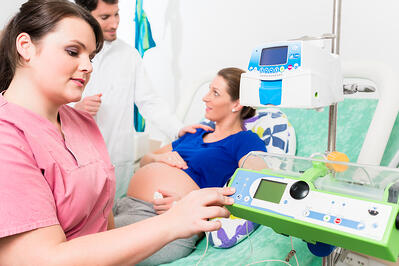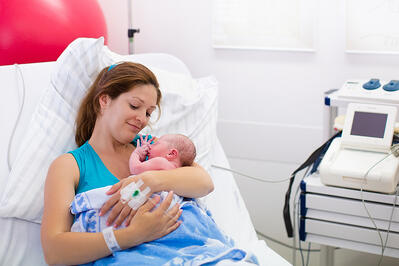It may feel like every decision just got a little more complicated—and the baby’s not even born yet. In fact, the decision on where to have your baby can seem like a complicated one in itself. So, how do you get started on finding the right place to give birth?
What to Look for in a Hospital for Delivery
There are a number of factors you may want to consider when trying to decide the perfect place to welcome your new baby.
Overall Safety and Quality
Probably the top consideration when choosing where to have your baby is to research the overall safety and quality of the hospital. For metrics applying to its maternity care, West Suburban Medical Center scores above every standard set by The Leapfrog Group, a national nonprofit organization that collects and analyzes hospital quality and safety performance. Our birthing center performs high on standard precautions, such as health screening for infants and blood clot prevention for mothers, as well as in these important areas:
C-Section rate: Nearly 1 in every 3 births is a Caesarean section (C-section), a number that experts agree is too high. There are many cases in which a C-section is the best option, but it is a major abdominal surgery often performed without medical necessity. Risks associated with C-sections include serious risk of infection or blood clots, and many women experience longer, more difficult recoveries. Check out what every pregnant woman needs to know about caesarean birth. West Suburban Medical Center has a low C-section rate—more than a third lower than the national average—because we put best practices in place to avoid medically unnecessary C-sections. Parents can take comfort in knowing that we have a surgical suite for emergency Caesarean birth as well.
 Episiotomy rate: Current medical guidelines limit the circumstances in which an episiotomy is recommended. An episiotomy is an incision made in the perineum during childbirth, and is linked with worse perineal tears, as well as problems such as incontinence and pelvic floor disorders. West Suburban Medical Center has a very low episiotomy rate, 80 percent lower than the goal rate set by The Leapfrog Group.
Episiotomy rate: Current medical guidelines limit the circumstances in which an episiotomy is recommended. An episiotomy is an incision made in the perineum during childbirth, and is linked with worse perineal tears, as well as problems such as incontinence and pelvic floor disorders. West Suburban Medical Center has a very low episiotomy rate, 80 percent lower than the goal rate set by The Leapfrog Group.
Your Baby, Your Choice
Many women want to deliver at a place where they are placed in control of birthing choices. The philosophy of respecting the mother’s choices in the birthing process is at the cornerstone of care at West Suburban Medical Center’s birthplace.
Choosing a provider: Your provider is your guide through pregnancy, childbirth, and postpartum care. At West Suburban Medical Center, you have the choice of board-certified OB/GYNs or certified nurse-midwives for your care. In fact, we have one of the largest midwifery programs in the Chicago area.
Pain management options: It’s important to have options for managing pain in the birthing process. We support a wide spectrum of pain management options, from epidurals to low-intervention techniques such as water labor and birth offered at our Alternative Birthing Center. We’re also proud to be one of the first hospitals in Chicagoland to offer nitrous oxide (also known as laughing gas) for pain control.
The Best Care For Your Newborn
Another consideration when choosing the right hospital is to ensure the best care is offered for your newborn.
 Top neonatology care: New parents can feel at ease knowing that West Suburban Medical Center partners with Ann & Robert H. Lurie Children’s Hospital of Chicago to offer patients direct access to the most advanced care for premature and critically ill infants. Lurie Children’s neonatologists are on staff at West Suburban Medical Center’s Level II Nursery. Additionally, registered nurses, certified in neonatal resuscitation and CPR, are on staff 24 hours a day.
Top neonatology care: New parents can feel at ease knowing that West Suburban Medical Center partners with Ann & Robert H. Lurie Children’s Hospital of Chicago to offer patients direct access to the most advanced care for premature and critically ill infants. Lurie Children’s neonatologists are on staff at West Suburban Medical Center’s Level II Nursery. Additionally, registered nurses, certified in neonatal resuscitation and CPR, are on staff 24 hours a day.
Breastfeeding resources: Experts agree on the many benefits of breastfeeding. But breastfeeding doesn’t always come naturally for mom and baby. West Suburban Medical Center offers a number of resources to help moms succeed in breastfeeding, including classes, support groups, and access to a certified lactation consultant.
Infant bonding support: Recent studies show that skin-to-skin contact immediately after birth is very beneficial to the baby. Our birthing center encourages uninterrupted skin-to-skin contact immediately after birth for both vaginal and C-section deliveries. Rooming-in with your baby also encourages bonding. Benefits include:
- Babies cry less and are easier to calm
- Moms learn baby’s feeding cues quicker
- Moms make more breast milk, faster
- Moms remain in control of the care they want for their babies
Support for Parents
Becoming a parent—even if it’s not the first time—can be overwhelming. It’s important to choose a place for delivery that provides resources to empower parents during the pregnancy, birth, and postpartum experience. In addition to a hospital experience that offers a home-like setting alongside expert medical care, we offer a number of classes, including:
Prepared Childbirth Class: Parents learn about different topics related to pregnancy, labor and birth, and the early days after the baby.
 VBAC Class: Did you have a C-section with a previous birth and want to know more about whether Vaginal Birth After C-Section (VBAC) is right for you? This class covers everything you need to know, from cultural considerations to risk comparisons between VBAC and C-section, exploring many tools and practices that reduce your overall risk of a repeat C-section.
VBAC Class: Did you have a C-section with a previous birth and want to know more about whether Vaginal Birth After C-Section (VBAC) is right for you? This class covers everything you need to know, from cultural considerations to risk comparisons between VBAC and C-section, exploring many tools and practices that reduce your overall risk of a repeat C-section.
Refresher Childbirth Class: This class provides a review of the stages of labor and how second or more pregnancies are different from the first pregnancy. It also includes a section on helping your older child or children to integrate the experience of having a younger sibling.
Prenatal Breastfeeding Classes: Learn breastfeeding techniques, answers to commonly asked questions, and information on the benefits of breast-feeding for mother and baby.
Breastfeeding Support Group: After birth, parents are invited to join us with your little one for hands–on practice, advice, support and education.
Placenta Encapsulation Information Session: In 2017 the CDC made recommendations about placenta encapsulation for specific medical circumstances. This one-hour free information session goes over basic placenta encapsulation and current recommendations.
Pain Management Tools: This class, which is co-taught with a midwife from West Suburban Midwives, provides an overview of pain relief tools, including:
- Hydrotherapy
- Nitrous Oxide
- Hypnosis for Childbirth
- Sterile Water Papules
- Doulas
- Narcotics
- Epidurals
Baby Care 101: This class is for any parent needing a crash course on how to care for infants, including diapering, swaddling, and other comfort techniques, as well as information about newborn sleep cycles, and more.
Register for these classes today.
Learn more about the Family Birthplace at West Suburban Medical Center.

